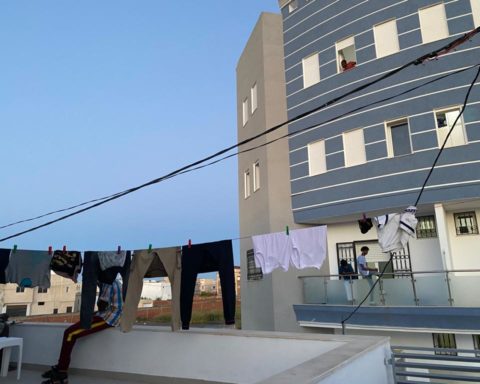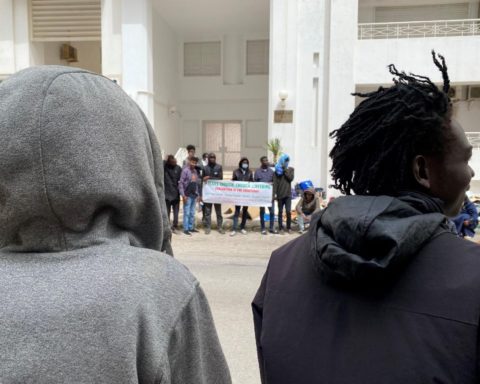… as from that place you can ever see the world… (F. Guccini, Il Pensionato, 1976))“Aquì en frente muere mucha gente!“, is the phrase shouted, repeated almost like an obsessive mantra, on the long afternoon of the VII Marcha Por la Dignidad which ran along the coast from the Spanish city-colony to the border with Morocco. We are on the other side of the Mare Nostrum, still in the middle between Africa and Europe, the city-state occupies the small strip of land that constitutes the extreme North of the African continent. The initiative, now recurring in the calendar of Spanish mobilizations, fixes the memory of the greatest migratory tragedy of the western route and is among the strongest criticisms of the work of the Spanish Civil Guard. The arrogant posture of the too many agents employed, smiles and defiant glances, the ribbon with Spanish colours knotted to the baton, the constant infiltrating the parade even with vehicles, are also to be read as a form of political speech during the day. Let’s try to retrace the story and place both the massacre and the development of the initiative within the complex framework of the city-village of Ceuta.

The facts and the process
On the morning of 6 February 2014 a group of migrants attempt to cross the Morocco-Spanish border along the sea at Tarajal beach. The Moroccan border guards force them into the sea, the Spanish open fire firing more than 300 rubber bullets, some tear gas, causing the drowning of 15 people a few strokes from the shoreline. Immediately a strong controversy on the legality of the action of the Guardia Civil is triggered, the rubber bullets are “anti-disturbance weapons” and do not fall under the protocol in this case. The trial, in which a network of associations and lawyers, such as Coordinadora de Barrios, are set up as plaintiffs, undergoes every attempt at cover-up by the authorities. Moreover, in the various parliamentary hearings that followed the events, the Ministry of the Interior (at the time of the events there was the Rajoy government) and the Guardia Civil often change version: first they deny the use of rubber bullets, then they admit their moderate use. They will be unmasked by a video of a witness who shoots more than 300 shots, among other things fired directly at people at sea (according to protocol, rubber bullets should never be fired directly at bodies). In a last ridiculous attempt at defense, the shots are justified as “self-defense” by the agents, but it is not clear how unarmed people swimming towards the shore, poised between life and death, can be a danger. In November 2019, the case was dismissed by the Ceuta Court of Instruction number 6: according to Judge María de la Luz Lozano, the hearing against the 16 officers of the Guardia Civil could not continue because it was only prompted by the popular accusation (the families of the victims were and still are in their countries of origin), since the Public Prosecutor’s Office and the State’s defence had asked for it to be dismissed for lack of “causes justifying the action of justice“. Faced with these shameful cover-ups, the seven editions of the Marcha have built up an element of concrete resistance and affirmation of the truth, while at the same time opening a space of relationship and expression that tends to take on its own physiognomy.
The look from Ceuta on migration issues
If the afternoon parade was focused on the claim “justice and respect for the victims”, the morning in the auditorium of the Town Hall ranged from legal updates to social criticism theatre, with a play staged by Teatro sin papeles, a company made up of migrants and activists. Putting political action for a fairer and therefore borderless world back at the centre of hospitality and reception practices: this is the indication that emerges from the round table animated by various subjects active in the territory and throughout Spain, from the Asociación pro derechos humanos de Andalucía to Paderas por la Vida from Morocco. The search for meaning lies in a multitude of small daily actions that are carried out with difficulty in a territory that is largely hostile to tracing the field of discussion, which ends with a praise, almost an incitement to act: “small actions, in small places, can change the world“. At first sight it could appear as the apologia of a minorityism that does not aim to subvert the relations of force within society nor the structures of command and repression: however, every expression must be placed and read within the overall political-social framework in which it develops.
Ceuta, the colonial legacy of the Empire that was
Nestled between the pillars of Hercules and Morocco, Ceuta does not hide its essence as a colony. Six centuries of control-autonomy to and from Portugal before, Spain since 1668, have shaped a society of upper middle class, career soldiers, civil servants, merchants and diplomats: an inherently conservative social composition that coexists, or tries to hide, another lower middle class city made up of waiting migrants and communities that now live there, in decadent barracks. The local government has been in the hands of the Popular Party for years and the last vote saw a large representation assigned to Vox, who expresses six councillors in total and who acts in perfect continuity with the national positions of the ultra-right party, which makes the total blockade of the migratory flow its own workhorse. Is Ceuta Africa? Spain? Europe? Landing, limit, beginning, end? The attempt to fit into a simple category the millenary junction between Africa and Europe, the Mediterranean and the Ocean, between cultures, ethnic groups and economies, all of which are now caught in the grip of the global transformation of the world, can only founder. The crossbreeding sculpted in the faces screech with the inevitable gratings on the windows of the horrible suburban barracks that dot the coastal area. Fear and the obstinate desire for isolation stand out against the smell of the sea and the clear sky, perhaps against the very history of this strange strip of land, certainly against anyone who moves. A city at the same time port and border, but without territory, a place of pure transit, which by nature is opposed to the sea, Africa, Islam, and without the space to do so, now against migrants, now against supportive subjects, a deep and almost inexplicable grudge.
Migrants, solidarity, racism and welcome at the borders of Europe
The overwhelming majority of people who today manage, despite the barriers, to enter Ceuta are minors alone, with behind them a life path still short but entirely marked by migration, no adults as a reference, neither home nor school or other aggregative organization. The adults in their lives are the border guards, the police, traffickers, rapists. The educators of the reception centres not only have to deal with their difficult stories and the times of the judges who will decide their future, but are caught between the delicacy of their work and the hostility of the population and the administration. It is not uncommon for open-faced insults to be shouted in the street, more often directed against women. Racism, here, is not a fact linked to colour, but to the political positioning of everyone’s way of life. Social stigma goes far beyond the criminalisation of the figure of solidarity to which we are unfortunately accustomed in continental Europe. The local newspapers’ chronicles tell of seizures of tons of hashish, smuggled goods, customs duty evasion and an open dispute with the central government on fiscal policy, a real element of autonomy beyond the formal statute of the city. A complex discourse addressed to an audience of officials that leads to identify as an enemy anyone who tries their own way to develop a project of autonomous life. Migrating and being on the migrant’s side sounds like intolerable acts. Solidarity and reception workers suffer this hood that takes their breath away, stops their mouths and makes mutual recognition impossible in a political form. La Marcha por la dignidad, bringing together in this territory hundreds of activists, mainly from Spain and Morocco, brings a breath of fresh air and finally allows some to criticize their work: MSNA, an unaccompanied foreign minor, has become for these people a prison made up of administrative procedures – or the total lack of indications of work, in short, a pure element of power that everything contemplates other than the dignity of people, and in particular the construction of a possible future.











